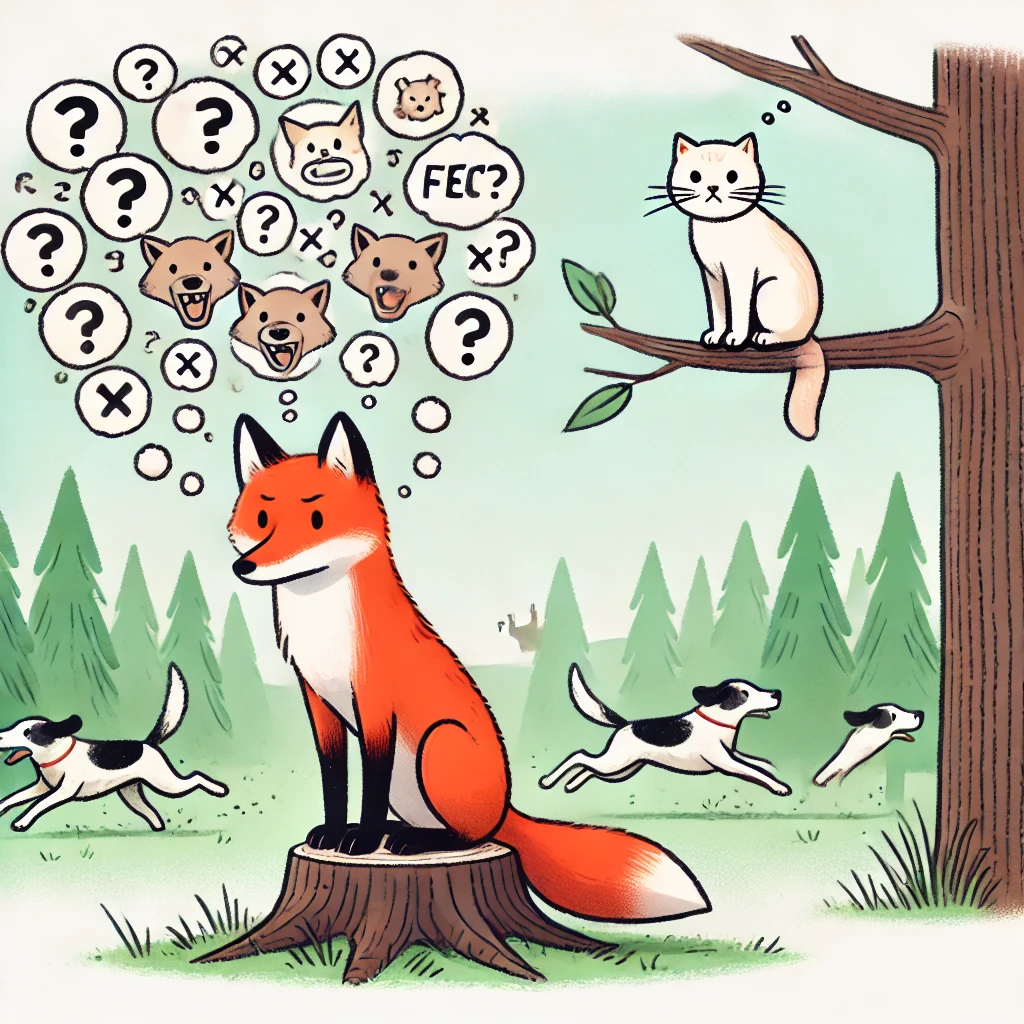A Fox was bragging to a Cat about how smart he was and how many tricks he had to escape from danger. “I have many tricks, maybe a hundred ways to escape,” said the Fox.
“I have only one way,” said the Cat, “but it usually works.” Just then, they heard the sound of hunting dogs coming. The Cat quickly ran up a tree and hid in the branches. “This is my plan,” said the Cat. “What are you going to do?”
The Fox started thinking of one trick, then another, but while he was deciding, the dogs got closer. In the end, the Fox couldn’t choose and was caught and killed by the hunters.
The Cat watched and said, “One good plan is better than many you can’t use.”
単語リスト
Fox – 狐
Cat – 猫
bragging – 自慢する
smart – 賢い
tricks – トリック、策略
escape – 逃げる、逃れる
danger – 危険
maybe – たぶん
hundred – 百
ways – 方法
only – ただ〜だけ
usually – たいてい
works – うまくいく
then – それから
heard – 聞いた(hearの過去形)
sound – 音
hunting – 狩り
dogs – 犬(複数形)
coming – 来ている(comeの進行形)
quickly – 素早く
ran – 走った(runの過去形)
tree – 木
hid – 隠れた(hideの過去形)
branches – 枝(branchの複数形)
plan – 計画、方法
thinking – 考えること(thinkの進行形)
another – もう一つの
deciding – 決めること(decideの進行形)
closer – より近く
end – 終わり
couldn’t – できなかった(could notの短縮形)
choose – 選ぶ
caught – 捕まった(catchの過去形)
killed – 殺された(killの過去形)
hunters – 狩人(hunterの複数形)
watched – 見た(watchの過去形)
good – 良い
better – より良い
use – 使う
文法解説
- A Fox was bragging to a Cat about how smart he was and how many tricks he had to escape from danger.
- A Fox (主語) + was bragging (動詞の過去進行形) + to a Cat (目的語): 「狐は猫に自慢していた」
- about how smart he was (副詞節): 「どれだけ彼(狐)が賢いかについて」
- how many tricks he had to escape from danger (副詞節): 「危険から逃れるためにどれだけ多くのトリックを持っているかについて」
- “I have many tricks, maybe a hundred ways to escape,” said the Fox.
- I (主語) + have (動詞) + many tricks (目的語): 「私はたくさんのトリックを持っている」
- maybe (副詞): 「おそらく」
- a hundred ways to escape (目的語の説明): 「逃げるための100通りの方法」
- “I have only one way,” said the Cat, “but it usually works.”
- I (主語) + have (動詞) + only one way (目的語): 「私は一つしか方法を持っていない」
- but it usually works (接続詞で結ばれた独立した文): 「しかしそれはたいていうまくいく」
- Just then, they heard the sound of hunting dogs coming.
- Just then (時を示す副詞): 「ちょうどそのとき」
- they (主語) + heard (動詞) + the sound (目的語): 「彼らは音を聞いた」
- of hunting dogs coming (形容詞句でsoundを修飾): 「狩猟犬が来る音」
- The Cat quickly ran up a tree and hid in the branches.
- The Cat (主語) + quickly ran up (動詞句): 「猫はすぐに駆け上がった」
- a tree (目的語): 「木に」
- hid in the branches (接続詞で繋がれた動詞句): 「枝の間に隠れた」
- “This is my plan,” said the Cat. “What are you going to do?”
- This (主語) + is (動詞) + my plan (補語): 「これが私の計画です」
- said the Cat (引用を示す部分): 「猫は言いました」
- What are you going to do (疑問文): 「あなたはどうするの?」
- The Fox started thinking of one trick, then another, but while he was deciding, the dogs got closer.
- The Fox (主語) + started thinking (動詞句): 「狐は考え始めた」
- of one trick, then another (考える対象): 「一つのトリック、次に別の」
- but (接続詞): 「しかし」
- while he was deciding (副詞節): 「彼が決めている間に」
- the dogs (主語) + got closer (動詞): 「犬たちが近づいた」
- In the end, the Fox couldn’t choose and was caught and killed by the hunters.
- In the end (副詞句): 「最後に」
- the Fox (主語) + couldn’t choose (動詞句): 「狐は選べなかった」
- and was caught and killed (受動態): 「捕まり、殺された」
- by the hunters (受動態の行為者を示す): 「狩人によって」
- The Cat watched and said, “One good plan is better than many you can’t use.”
- The Cat (主語) + watched (動詞): 「猫は見ていた」
- and said (接続詞で繋がれた動詞): 「そして言った」
- One good plan is better (主語 + 動詞 + 補語): 「一つの良い計画はより良い」
- than many you can’t use (比較対象を示す副詞節): 「使えない多くの計画よりも」



コメント